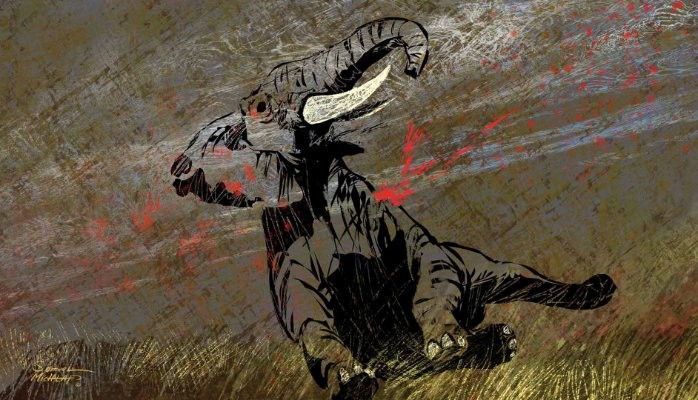
Big Idea 2015: It's Time to End Poaching
In this series of posts, Influencers and members predict the ideas and trends that will shape 2015. Read all the stories here and write your own (please include the hashtag #BigIdeas2015 in the body of your post).
An elephant is murdered every 15 minutes. More than 30,000 elephants are killed by poaching every year. If we don’t act now, elephants could be extinct in just 11 years. We need to make 2015 the year we end poaching.
I am writing this from Ulusaba, the stunning private game reserve we are so fortunate to manage in the heart of South Africa. Earlier I went out on safari and saw some majestic elephants and rhinos up close and personal in their natural habitat – wild and free.
By Trevor Savage, courtesy of Ulusaba Private Game Reserve
Sadly, this kind of incomparable encounter is becoming far too rare, and may soon be a thing of the past for our children and our children’s children. Now, when a human sees an elephant in the wild, all too often it is with the intention of killing it for its ivory.
The problem with poaching is not simply one of animal conservation, as this startling new film from Kathryn Bigelow, Last Days, illustrates so vividly.
Terrorist groups such as al-Shabaab, The Lord’s Resistance Army, Boko Haram and Janjaweed all use the sale of illegal ivory to carry out attacks. There are direct links between poaching and terrorism that have resulted in atrocities around the globe. Trafficking in endangered species is the fourth largest illegal business in the world after drugs, weapons and human trafficking.
Image by Last Days
The stats are no better for rhinos. Ninety-five percent of the world's rhinos have been lost in the past 40 years. In 2007 13 rhinos were poached in South Africa — in 2013 more than 1,000 were killed. By the end of October this year, 1,020 rhinos had been killed in South Africa. The bulk of the deaths – 672 – were in the Kruger National Park, which neighbours Ulusaba and is home to the largest population of rhino in the world. Demand for rhino horn comes overwhelmingly from China and Vietnam, where many people wrongly believe it has medicinal properties.
Huge sums are spent on studying and protecting rhinos in the wild, however very little has ever been spent on addressing the root of the problem – eliminating the demand for rhino horn. A 2012 WildAid survey found more than 66 percent of Chinese citizens did not know horns came from poached rhinos.
Image by Last Days
This may all sound very negative, but there is still hope that poaching can be stopped. Let’s be clear: this is a problem of human making, but it is one that we have the power to change. It is up to all of us to ensure these magnificent species do not disappear from the earth forever. On top of stopping the demand for rhino horn, we must call upon governments in supplier countries to strengthen governance and root out corruption. Plus, the international community has to contribute and help these countries build the capacity needed to effectively monitor and protect animal populations and vigorously go after poachers.
People all over the world are uniting to help end poaching. My fellow WildAid ambassadors, David Beckham and Yao Ming, have thrown their support behind efforts to end the illegal wildlife trade. Meanwhile, The Duke of Cambridge has raised the issue with President Obama on his US visit.
If you want to join the effort to end poaching, there are lots of ways to get involved. As well as WildAid, we're supporting initiatives such as the Elephant Parade, the Global March for Elephants and Rhinos. Donate to and spread the message of WildAid, and the other wonderful organisations listed by the Last Days team. Take the pledge to never buy or accept ivory. As WildAid say: when the buying stops, the killing can too.




Able Seaman (Naval Strike Craft) 1980 : 1982, & and later Sargeant (SA Army Instructor) 1982 : 1993 at South African Defence Force
7yIt is said, there are approximately only 5000 Rhino's left in the Wild, and we are slowly but surely losing the battle or rather struggle, for their conservation and survival.................................Say no more..............................
Able Seaman (Naval Strike Craft) 1980 : 1982, & and later Sargeant (SA Army Instructor) 1982 : 1993 at South African Defence Force
7yPlease Mr Branson, I would really appreciate it if you yourself would comment on my letter I wrote. Thank you for your time and understanding. Kind Regards, Skippie
Able Seaman (Naval Strike Craft) 1980 : 1982, & and later Sargeant (SA Army Instructor) 1982 : 1993 at South African Defence Force
7yI am an ex-Military Veteran of 13 years. I have this dream and plans to save our Rhino's, Elephants and all cat species. Such a venture will definitel demand lots of funds, that I unfortunately do not posess over. People in this Country, and Government, do not take this matter as seriously as they should. Everybody cries wolf, but when push comes to shove, it's a different story altogether. We do do not have to hide Rhino's ect./ but reather put them in the open for everybody to see and enjoy. Out of sight, Poached !!. Wildlife in this country has become an income. By saying that, I mean they are exploited for financial gain under the cover of so-called "Income from Tourism". Deny how much they want, that's a fact. And the only ones pulling the short straw here, are our Wildlife. So let us see who is prepared, interested whatever you want to call it, to share this venture I want to desperately embark on. Kind regards to all, "Skippie"
Company Director Principal Geologist at ORE
8ylast two white rhino have had to be hidden to prevent poaching.